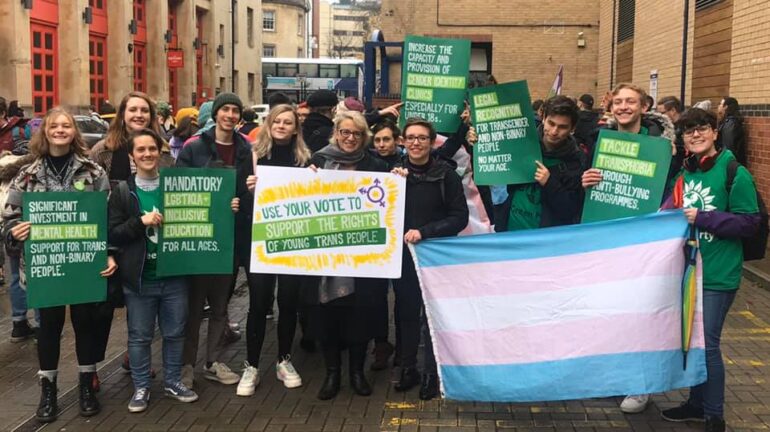Criminalising the purchase of sex: Who cares what sex workers say?
Nine is a writer and editor who spent six and a half years working with sex workers in Edinburgh. Follow her at @supernowoczesna, and read her response to Rhoda Grant’s consultation here.
At the end of May, Scottish Labour MSP Rhoda Grant published the results of her public consultation on her proposed Criminalisation of the Purchase of Sex (Scotland) Bill. It’s a disappointing read: rather than providing an informed, nuanced analysis of the issue, the summary document is largely a showcase of glib sloganeering and hyperbole, brushing aside the concerns of the sex workers that Grant claims her proposed Bill will help. Below is a by no means exhaustive list of problem areas.
Lack of transparency
Tasking Grant herself with summarising the consultation responses wasn’t a promising start in terms of objectivity, but that’s how the Scottish Parliament does these things. What could have been improved was the filing of responses: this was a mess, with some of them listed but missing, and others just missing. Forced anonymisation featured in some cases, such as that of an Australian sex worker who, unable to locate her response, contacted Grant’s office to be informed that her name had been redacted despite her request that it be used. She commented, “From everywhere we are hidden and silenced, even when we agree to be out!” At the time of writing, numerous other respondents, among them sex workers, still don’t know whether their responses have been included at all.
The rogue Amnesty branch
Amnesty International’s Paisley branch was quoted more times in the summary than any other organisation, with Grant omitting on two occasions to clarify that the quotes weren’t from Amnesty headquarters. Their letter begins with the disclaimer that it “does not reflect the policy of Amnesty International UK”, begging two questions: why the group used Amnesty’s name at all, and why Grant was happy to cite it so many times without ever acknowledging this caveat. Amnesty International UK has indicated that it will be in touch with both Paisley and Holyrood to clarify its position, but to unwitting readers, its prominence in the report could serve to lend Grant’s agenda a degree of legitimacy. Furthermore, the Paisley response is a shoddy excuse for the thorough research one might expect from Amnesty, with one particularly low point being the appropriation of a woman’s scars to dismiss her claims of freely choosing sex work.
Misuse of academic research
Multiple responses debunked Grant’s misleading references to research in her consultation document. Scot-PEP, for example, looked into her claim that 75% of women in prostitution became involved as children, and found that the paper cited – Margaret Melrose’s Ties That Bind – did not in fact back this up. This was, they stated, “at best misrepresentation of the particular study, at worst… a deliberate lie and unethical use of a perfectly legitimate academic resource.” They went so far as to contact Melrose herself, who clarified the context of her study, the conclusions drawn from it, and her opposition to the criminalisation of sex workers’ clients. However, Grant’s summary merely includes a few quotes criticising her selective approach to academic research – criticisms which could easily be interpreted as opinions rather than hard evidence. This leaves a lot more room for detractors to simply steer the debate back into who is and isn’t representative, rather than reflect on the implications of such a skewed perspective.
Marginalisation of expertise
Those who had studied or witnessed first-hand the negative effects of laws such as Sweden’s sex purchase ban or Scotland’s criminalisation of kerb-crawlers were occasionally quoted in the summary document, but on minor points rather than the main issues discussed in our responses. It was only by chance, for example, that I discovered that Jay Levy had contributed much more than a brief remark on the definition of payment – in fact, having researched the effects of Sweden’s legislation, he had sent in a description of its “considerable and multitudinous” negative outcomes. Similarly, Grant quotes the profile supplied by Drugs Action’s Quay Services project of the mainly street-based sex workers it supports, but not its acknowledgement that indoor-based and street-based sex workers have markedly different needs, or that, following the 2007 Prostitution (Public Places) (Scotland) Act, the project saw sex workers’ safety compromised alongside their contact with health and welfare services. Grant seems more invested in promoting a specific image of sex workers than in discussing the negative effects of criminalising clients, even when respondents have detailed specific experiences of this.
Dismissal of financial concerns
Under the heading “Personal financial loss”, numerous quotes are supplied regarding loss of earnings faced by sex workers if Grant’s legislation goes ahead, but this section ends with “a different perspective” provided by Zero Tolerance. This “different perspective” quotes an English study that found sex workers charging an average of £37 for sex, and does not mention, let alone solve the problem of, loss of earnings. The study in question is on survival sex workers rather than representing the industry as a whole, but since a loss of earnings remains detrimental to anyone who experiences it, this point seems to have been included here to steer readers away from taking the issue seriously.
Rejection of harm reduction
Numerous organisations which might previously have been classified as proponents of harm reduction have taken an alarming U-turn. The Scottish Sexual Health Promotion Specialists group, for example, advocates the opposite of UNAIDS recommendations through its endorsement of the Bill. They cite as their sources the Swedish government and prominent prohibitionists, but like many other respondents, they claim to be unaware of any unintended consequences of criminalising clients. It seems, then, that they don’t actually know very much about the issue at all.
Exiting: the only ‘solution’
Grant lays bare her agenda with these remarks: “It was clear that the majority of those who have already exited prostitution were in favour of legislation, while those currently involved were fearful of the impact on them. What this highlights to me is that regardless of legislation more support must be given to those who wish to exit.” And there we have it: the solution is exit programmes and only exit programmes. Sex workers are constructed as having no other needs or desires worth considering. They should either avail themselves of exiting support, or face the negative effects of Grant’s legislation by themselves.
Collateral damage
Grant’s thoughts on violence are also telling in their brevity. “Those against legislation said that it would be detrimental to prostitutes and would lead to attacks,” she writes. “However, rape and attacks happen now, these are illegal now. While those who currently break the law will not see the criminalisation of the purchase of sex as a deterrent many others will.” Her end goal is a reduction in clients rather than a reduction in violence. A reduction in law-abiding clients will push desperate sex workers towards violent and predatory clients, who will constitute a larger percentage of the shrinking client group. To rationalise this because rape and attacks already happen is a callous dismissal of the trauma experienced by those on the receiving end. Shockingly, groups such as Rape Crisis Scotland endorse Grant’s perspective.
What’s next?
To progress, Grant’s proposed Bill needs support from 18 MSPs across three parties by the end of June. It’s time to write to your MSPs and discuss what she hasn’t, before sex workers are further let down by the law.



Hi there to every single one, it’s genuinely a good for me to pay a visit thiss site, it
includes important Information.
You could certainly see your exppertise within the work you write.
The world hopes for more passionate writers such as you whoo are not afraid
to say how they believe. At all times folkow your heart.
If you are interested here are the responses by sex workers:
15, 20, 31, 36, 37, 52, 65, 126, 147, 154, 172, 177, 179, 339, 404, 406, 430, 434, 450, 455, 526, 532, 555, 562, 565, 567, 568, 584, 647, 662, 671, 673, 687, 690, 694, 698, 710, 721, 752, 760, 794, 789, 790, 793, 807, 812, 816, 818, 836, 846, 854, 855, 863, 864, 866, 869, 871, 872, 886, 947, 952
The street scene is indeed considerably different from the rest of the sex industry, and it’s frustrating that it’s often taken out of context and presented as representing the industry as a whole, despite the fact that only around 10% of the UK’s sex workers are street-based.
I’d say that over the years, the majority of the street-based sex workers I encountered in Edinburgh would have preferred not to be there if they could help it (though some would have preferred to work indoors rather than to leave the industry altogether). It used to be different, but with the loss of the tolerance zone, the introduction of the kerb-crawling legislation, and sporadic police crackdowns, fewer women remained working on the streets if they had any other options, and drug dependency was increasingly a feature.
But often it feels as if people focus on the choice debate, and go no further, and that’s what I’m afraid Rhoda Grant is repeating. The Prostitution (Public Places) (Scotland) Act made sex workers’ lives worse, yet it was allegedly motivated by concern for their well-being. If you’re interested, here is an earlier piece I wrote about how an already bad environment deteriorated.
http://feministire.wordpress.com/2012/11/23/taking-ideology-to-the-streets-sex-work-and-how-to-make-bad-things-worse/
Buying sex or sex-related services is not always to the detriment of the person selling – as one pole-dancer in the US who makes hundreds of dollars a night in tips once said, “I’m not the one being exploited”. On the other hand, as a former drugs worker I would say that buying sex from street-workers under the archetypal lamplight almost always is a predatory act, because prostitutes generally do not work on the streets by choice.
Wading through the responses of the pro-Bill advocates (those that are not mysteriously “missing”) one can’t help noticing the same paragraphs repeated verbatim again and again -which suggests some sort of organised response orchestrated by prohibitionists who are obviously copying and pasting from the same script. So for instance:
“Prostitution is a form of violence against women, and criminalising the purchase of sex would tackle demand and reduce the incidence of violence against women.”
“More than half of women in prostitution in the UK have been raped and/or seriously assaulted and at least 75% have been physically assaulted at the hands of pimps and punters, according to Home Office statistics from 2004 (Home office (2004) Solutions and Strategies: Drug Problems and Street Sex Markets).”
“Despite the claims of a minority who appear to have chosen prostitution, almost every time sex is purchased, a vulnerable person is being exploited, and criminalising the purchase of sex would reduce the incidence of sexual exploitation”
“75% of UK prostitutes entered prostitution under the age of 18, and in some areas over 90% are addicted to illegal drugs. In interviews conducted with 475 individuals in prostitution in five countries 73% reported they had been physically assaulted and 62% had been raped, and 92% stated that they would leave prostitution immediately if they were able to (Farley et al (1998) Prostitution in five countries: Violence and Post Traumatic Stress Disorder).”
“In Sweden after the criminalisation of the purchase of sex, both indoor and outdoor prostitution were significantly reduced, gender equality was promoted as an important value, attitudes toward purchasing people for sex changed, demand was reduced and instances of human trafficking were reduced. Similarly, in Norway, one year after the criminalisation of the purchase of sex, prostitution on the whole both indoor and outdoor was halved”
And on and on-the same old lies. Occasionally the authors feel sufficiently embarrassed about plagiarism to try to reword some of the text slightly.-Have they no shame?